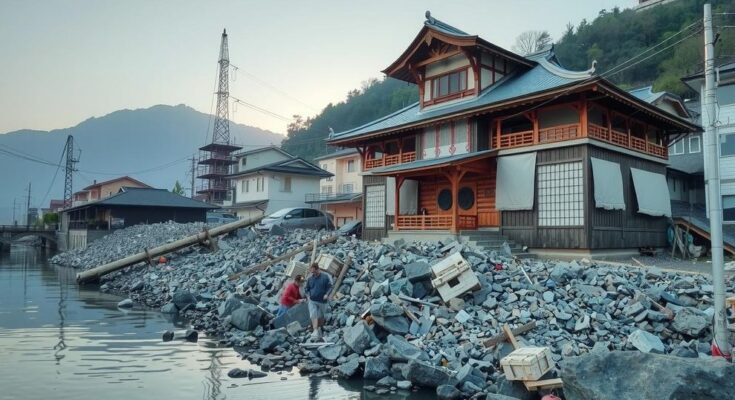One year after the Noto Peninsula earthquake, mental health challenges, cultural loss, and societal failures have emerged as significant issues overshadowing physical recovery efforts. Many survivors struggle with isolation and an increased risk of suicide. The article underscores the need for comprehensive recovery initiatives that prioritize emotional support and cultural preservation, emphasizing the importance of learning from past disasters to avoid repeating the same mistakes.
One year has passed since the devastating magnitude 7.6 earthquake struck Noto Peninsula in Ishikawa Prefecture on January 1, 2024. The immediate causalities included over 220 lives lost, while the aftermath has revealed a more profound crisis: the psychological aftermath and cultural erosion plaguing the survivors. This hidden toll often surpasses conventional disaster-related deaths and encompasses mental health issues, suicides, and a slowly deteriorating social fabric. This article seeks to address these urgent challenges and their implications for recovery efforts.
The isolation experienced by survivors has exacerbated mental health issues, resulting in increased rates of depression and suicidality. Temporary housing settlements predominantly occupied by elderly individuals have become breeding grounds for despair and loneliness. An elderly man lamented about his disconnection from neighbors, stating that despite their physical proximity, he felt isolated and uncertain of their well-being. Such sentiments reflect a broader trend within the community, where individuals, although physically present, face emotional dislocation sure to lead to further psychological crises.
In addition to physical destruction, a significant loss of cultural identity is underway. The earthquake has dismantled community structures essential for social engagement, such as gathering places and cultural sites. A displaced cafe owner expressed concern over the disintegration of communal bonds created through shared experiences within her cafe. This cultural loss is subtle yet profound, as it risks severing those intergenerational connections that maintain the community’s heritage.
The shortcomings in society’s response to these secondary tragedies are alarming. As history has shown, past earthquakes like the Great Hanshin-Awaji Earthquake and the more recent Great East Japan Earthquake have illuminated similar patterns of neglect toward mental health after disasters. The situation in Noto, with its rising rates of disaster-related deaths, signals that society continues to ignore the lessons learned, representing a missed opportunity for preventative measures.
To curb the forthcoming invisible disasters, a comprehensive approach to recovery is imperative. Recovery initiatives must extend beyond mere infrastructure rebuilding to encompass emotional and psychological support systems for survivors. Organizations such as Civic Force strive to bridge this gap through community engagement, yet broader, systemic approaches are necessary. Additionally, creating memorials and documenting survivor stories will help preserve the memory of the community and promote dialogue concerning these prevalent issues.
Reflecting on the Noto Peninsula experience, it is crucial to acknowledge that while resilience exists among the survivors, it should not be the sole expectation. Each individual impacted by the disaster deserves support that extends beyond the physical reconstruction of their homes. Future disasters are inevitable; however, the accompanying tragedies should not be. The choices society makes in response to these events are critical to ensuring no individual is left behind. Therefore, it is pertinent to address the unspoken toll disasters impose upon communities and actively work towards alleviating it.
On January 1, 2024, the Noto region of Ishikawa Prefecture in Japan experienced a significant earthquake measuring 7.6 on the Richter scale. The immediate aftermath was marked by widespread devastation, including structural damage to homes and public facilities, loss of life, and disruption of social networks. As recovery efforts progressed, profound mental health challenges, including isolation and suicides, began to emerge, demonstrating that the impacts of the disaster extended far beyond the physical destruction. This situation draws parallels to past earthquakes in Japan, where survivors faced similar secondary crises, indicating a pressing need for a comprehensive approach to disaster recovery that includes mental health support and cultural preservation.
The Noto Peninsula earthquake serves as a stark reminder of the multifaceted challenges faced by disaster-stricken communities. While rebuilding infrastructure is crucial, it is equally important to address the psychological and cultural ramifications of such events. Fostering community connections, preserving cultural identity, and providing mental health resources are vital components of true recovery. If society heeds the lessons imparted by this disaster, it may reduce the hidden toll that often accompanies tragic events, ensuring that no survivor is left to navigate the aftermath in isolation.
Original Source: japan-forward.com




